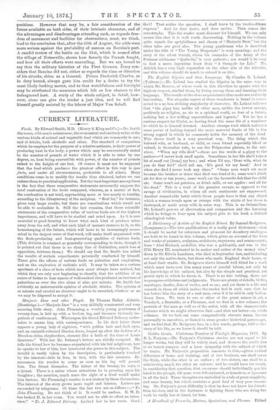Marjorie Daw and other People. By Thomas Bailey Aldrich. (Routledge.)—"
Marjorie Daw " is a very skilfully constructed and very amusing little story. John Flemming, a wealthy young gentleman of twenty-four, is laid up with a broken leg, and becomes furiously im- patient of confinement. Whereupon his friend Edward Delaney under- takes to amuse him with correspondence. In his first letter there appears a young lady of eighteen, "with golden hair and dark eyes, and an emerald-coloured illusion dress, looped up after the fashion of a Dresden-china shepherdess, chaussee like a belle of the time of Louis Quatorze." With her Mr. Delaney's letters are chiefly occupied. He tells his friend how he becomes acquainted with his fair neighbour, how he speaks to her of him, how interested she grows in this subject. The invalid is vastly taken by the description, is particularly touched by the interest—falls in love, in fact, with the fair creature. He announces his resolve to come as soon as his leg will permit him. The friend dissuades. The father of the beauty, he says, is a tyrant. There is a suitor whose attentions he is pressing upon his daughter ; the mention, much more the sight of a rival would make him furious. Mr. Flemming's resolve is not shaken by these dissuasions. The interest of the story grows more rapid and intense. Letters are succeeded by telegrams. Of these the last two are as follows :—" To John Flemming. Do not think of it. It would be useless. R. W. D. has locked M. in her room. You would not be able to effect an inter- view." "To J. Edward Delaney. Locked her in her room. Good
God! That settles the question. I shall leave by the twelve-fifteen express." And he does leave, and does arrive. Then comes the catastrophe. This the reader must discover for himself. We can only assure him that it is well worth discovering. Nothing in the volume quite equals the sprightliness and charm of "Marjorie Dow," but the other tales are good also. The young gentleman who is described under the title of "The Young Desperado" is very amusing; and the story of the silent recruit, whom his comrades of the Army of the Potomac nickname "Quite-So," is very pathetic ; nor would it be easy to find a more ingenious hoax than "A Struggle for Life." Mr. Aldrich has a vary high reputation on the other side of the Atlantic, and this volume should do much to extend it on this.


































 Previous page
Previous page